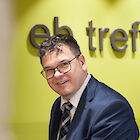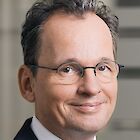Success factor:
Support and offering
true career paths.
Jörg Veit
“The specialists have a true thirst for knowledge. They are very diligent, committed, and do a lot to come here.”
Jörg Veit, Managing Director of HR, Elektro Breitling GmbH
To be honest, it just sort of happened. We published job advertisements in Germany via job portals. Then we received our first application from Damir in Bosnia in 2016. We conducted our initial interviews online. He already spoke perfect German, since he had been a refugee in Germany with his parents as a child, and had attended kindergarten and primary school here. Today, we receive almost all of our international applications via job portals. However, we receive most applications that are really a good match through employee recommendations.
We are looking for specialists with electrotechnical training. This is often not comparable to what we have in Germany, however, so most people receive a partial recognition initially.
Typically, the Chamber of Trades gives a recommendation on where there are deficits in terms of the desired profession. Then we start qualifying the employee. Training in the West Balkans is all in-school, meaning they often lack practical experience. We review how we can boost the employee’s qualifications through on-the-job training and other educational measures. During this time, they gain the practical knowledge they are lacking. They also complete relevant advanced training programs at the same time, for instance in measurement technology or building automation. We then submit the training plan to the Chamber of Trades, and specialists usually receive their full recognition after a year at most. This normally ends in the career Electronics technician for energy and building engineering, or in plant engineering.
Yes. Full recognition is very important to us and to the employees. We've set employees on true career paths, for instance Suad from Bosnia and Herzegovina: After an adjustment qualification, he worked as a fitter for two years, then completed a senior fitter training, and today he’s a senior fitter, with the salary that comes along with it. This is a remarkable achievement; at our company, a senior fitter leads a team of 10 - 25 workers. Currently, three other employees, two Serbs and one Bosnian, are pursuing this same path.
My colleagues and I handle it; there are also mentors supporting them in the departments and on the construction site.
We offer international specialists weekly language courses as well at three language levels. In addition to qualification, we offer another important benefit: 14 company apartments. New arrivals can move into one of them for a time, then look for their own apartments from there independently. This works sometimes, and sometimes it doesn't – because affordable housing is tough to find here. The apartment situation is our biggest obstacle to getting specialists to move here. We also support employees with families as they look for school placements. This is difficult; integration classes are full, and there are not enough teachers to make them larger.
On the other hand, we now have a true West Balkan community who supports one another. However, there is also the danger that a bubble could form, causing people to lag in their language learning. Because of this, we generally try to have mixed teams on the construction site.
You know, looking at the entire EB Group as a whole, we have 17 nations represented. Construction is becoming marked by more international collaboration; there is no resentment. Luckily, our employees get together privately, without us requiring them to. A group of colleagues might go to the Christmas market, for instance, or organize a cookout to promote cohesion.
Of course, as an employer you need to show tact in terms of your commitments. It can be a balancing act. As a relatively large company, your workforce covers the whole bandwidth of society. We have to make sure all of our employees receive the same opportunities – that everyone receives the individual support and help they need, and that it is a win-win situation for everyone involved.
The specialists have a true thirst for knowledge. They are very diligent, committed, and do a lot to come here. Many international workers are expressly thankful, because they were not always treated fairly or supported at all in their last jobs. One example: Each month, we offer voluntary seminars for all fitters. International specialists often attend; the ratio of international to German colleagues among attendees is an example. They are very motivated in this respect, and you can see they want to succeed and build a life here. This impresses me very much. Once again, employees who increase their qualifications and language skills can have a career here with us in the trades.
Yes, it will. But there as well: Because we treat people with respect, we will always have a flow of workers. We don’t differentiate between our employees, either in their equipment or in how we treat them. This is not the case at all companies, as I regularly hear in applicant interviews, and is our competitive advantage. I don’t need to conduct major advertising campaigns. Instead, we get the level of applicants we can handle. I'm not afraid. The competition can bring it on.


























